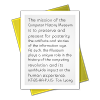Description
Peter Lax speaks with Phil Colella about a range of topics from his distinguished career in computing and numerical analysis. During World War II, Lax spent a year at Los Alamos, which he describes as a nearly ideal intellectual environment. There, John von Neumann was looking to computing to help solve atomic bomb calculations, and Lax began programming what computers existed at the time. He then went to the Courant Institute at NYU, where he remained for the rest of his career. He developed the celebrated Lax equivalence theorem in the early 1950s. Lax then moved to shock capturing and conservation laws. Among the strongest influences on Lax was von Neumann, who helped Lax upon his initial arrival in the US in 1941 and continued to help him in his early career. A number of Lax’s students have enjoyed very successful careers, including Ami Harten, Burt Wendroff, and Alexandre Chorin. Lax also discusses his interaction with a number of current and former Courant colleagues, including Paul Garabedian, Tony Jameson, and Marsha Berger. For most of the 1970s, Lax was director of the NYU computing center, and he was instrumental in acquiring a CDC 6600 from the AEC. Lax and several colleagues actually saved the 6600 machine from being destroyed in the aftermath of an antiwar protest in which the machine had been taken hostage. He also led the very influential Lax Report, completed in 1982, which noted the lack of supercomputing facilities in universities and argued that scientists without access to supercomputers were eschewing problems requiring computational power and jeopardizing American scientists’ leadership in certain research areas. Mathematics will continue to be important to computing, Lax believes, and he thinks that computational mathematics has a very bright future.
Date
2003-11-14; 2004-04-24
Contributor
|
Colella, Philip, Interviewer
|
|
Lax, Peter D., Interviewee
|
Publisher
SIAM and U.S. Department of Energy
Place of Publication
Los Angeles, California, United States; New York, New York, United States
Extent
30 p.
Format
PDF
Copyright Holder
Computer History Museum
Category
Transcription
Subject
Lax equivalence theorem; Shock-capturing method; Hyperbolic partial differential equations; Conservation law; Entropy condition; Lax–Friedrichs method; Lax Report
Collection Title
Society for Industrial and Applied Mathematics (SIAM) oral history collection
Credit
Gift of SIAM and the US Department of Energy


